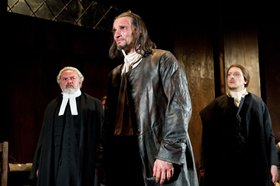The very spareness of Sabine Dargent’s set for The Crucible strikes the eye with the force of a Rembrandt painting. Dark wood-panelled walls enclose on three sides a simple bed stage left and a chair and table stage right, set on a floor of stained boards. Overhead hangs a truss of heavy wooden beams in the same ruddy hue. This strong visual impact resonates throughout the production in the adroit use of chiaroscuro in Ben Ormerod’s lighting: in moments where action is frozen momentarily as a form of gestus; and in the beautiful transitions within the mise-en-scène. Panels open to reveal doors and windows and swivel as actors in character shift the set from one scene to another. The scenography becomes the action in every sense.
Miller’s original explored the capacity of words, whether spells or accusations, to conjure reality as a repudiation of the work of the House Un-American Activities Committee of the 1950s. There are obvious parallels, too, to contemporary events whereby the Salem witch trials of 1692 might serve as a metaphor for how societies irrationally hunt out the unclean in their midst. Morrison, however, has resisted the temptation to impose such equivalences, allowing the action to speak directly to the audience. To do this, he has created an ensemble performance in which bodies are the central focus. In his staging, much of the drama derives from the ways in which words are deployed to contain and control bodies, while the corporeal continuously erupts to disturb Puritan sensibilities.
The action is instigated through the discovery of teenage girls dancing naked in the woods of New England and the subsequent illness of the Minister’s daughter, Betty Parris (Aisling Groves McKeown) on which the play opens. The girls’ ringleader is Abigail Williams (Aoife Duffin). Duffin’s playing shifts from naivety, to petulance and then a shrewdness that has come from Abigail’s affair with local farmer, John Proctor (Patrick O’Kane). With a sharp look and jut of her chin she is able to command the compliance of her peers, as she invents stories of witchcraft to protect herself and exercise power in a community where she otherwise has none. She is ably supported by a chorus of village girls which manages to operate in synchronisation, occasionally descending into improvised chaos, yet with each remaining distinct. The ways in which aging men seek to corral these young women’s bodies reverberate throughout the production. The words by which they plead, berate and threaten are amply demonstrated in the desperation of Malcolm Adams’ Reverend Parris as he struggles against bewilderment to save his daughter’s life. Yet he physicalises all his strategies too, grabbing, shaking, and pulling Abigail across and around the room. The relationship between words and actions are emphasised further when the Reverend Hale (Ruairi Conaghan) enters with a pile of books to pursue witchcraft with all the showmanship of an evangelical preacher.
 It is in the central figure of John Proctor, however, that the struggle between words and flesh is most centrally articulated. Patrick O’Kane’s Proctor ripples with sinewy strength, his dreadlocked hair, rolled-up sleeves and long leather coat billowing behind him visually marking him out from the buttoned-up witch-hunters. Confident, unruly and dismissive of his peers at the outset, Proctor is vulnerable when confronted by Abigail and cowed by the silent reproaches of his wife, Elizabeth (Catherine Cusack) at home. O’Kane deftly navigates Proctor’s unfolding torment as a man torn between guilt, duty, bafflement and pride, clinging by the end to his good name in defiance of his accusers. In the final scene, Joan O’Clery’s costume design presents him and Elizabeth shackled, their bodies marked with signs of torture, their clothing torn and stained. It is in this state of abjection that they rediscover physically their shared and unconstrained love, a scene played with poignant tenderness by O’Kane and Cusack.
It is in the central figure of John Proctor, however, that the struggle between words and flesh is most centrally articulated. Patrick O’Kane’s Proctor ripples with sinewy strength, his dreadlocked hair, rolled-up sleeves and long leather coat billowing behind him visually marking him out from the buttoned-up witch-hunters. Confident, unruly and dismissive of his peers at the outset, Proctor is vulnerable when confronted by Abigail and cowed by the silent reproaches of his wife, Elizabeth (Catherine Cusack) at home. O’Kane deftly navigates Proctor’s unfolding torment as a man torn between guilt, duty, bafflement and pride, clinging by the end to his good name in defiance of his accusers. In the final scene, Joan O’Clery’s costume design presents him and Elizabeth shackled, their bodies marked with signs of torture, their clothing torn and stained. It is in this state of abjection that they rediscover physically their shared and unconstrained love, a scene played with poignant tenderness by O’Kane and Cusack.
The casting of the production is impeccable, producing a finely tuned ensemble performance, with a number of other outstanding individual performances. Physicality and personal authority are matched in Alan Stanford’s Deputy Governor Danforth, prowling like a choleric bear between the witnesses to his hearing. Charlotte McCurry as Mary Warren negotiates meticulously her teenage coquettishness, fear and eventual treachery when she recants her testimony against Abigail. Morrison’s decision to have his actors work in their own (predominantly Northern Irish) accents is vindicated as the cadences of Miller’s constructed seventeenth-century speech tripped easily off the tongue.
This production, then, demonstrated the highest standards in every aspect, setting a benchmark for the future work of the restored Lyric. It was a joy to watch. The wealth of talent across the generations available to producers in Northern Ireland was on display here. The challenge now is to ensure that it is as well-served in the future.
Tom Maguire is a Senior Lecturer in Theatre Studies at the University of Ulster.